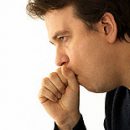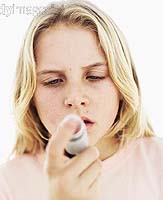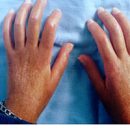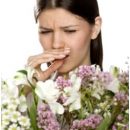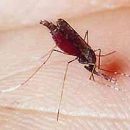What is apnea? What are the symptoms of apnea? Depression and apnea - in what pattern? Answers you will find in this article.
Content
What is apnea
Snoring and night apnea syndrome are different things. Snoring is just a loud sound that occurs when breathing when you sleep if there is some kind of obstacle in the respiratory tract. It is unpleasant for someone who sleeps next to you, but snoring does not apply to pathological states threatening health. The night apnea syndrome is characterized by the fact that the respiratory stop occurs during sleep, as a result of which a person can wake up. Snoring does not necessarily combine with night apnea syndrome.
Symptoms of sleep apnea
- Periodic stop of breathing during sleep (apnea).
- Periodic attacks choking during sleep.
- Loud, noisy snoring.
- Sudden wakeup in order to resume breathing.
- Awakening in sweat at night.
- The feeling of how you did not sleep in the morning.
- Headache, sore throat or dry mouth in the morning.
- Sleeping day.
Types of apnea sleep
Night apnea syndrome can be three types:
- obstructive,
- central
- mixed.
Obstructive type of sleep apnea - This, as already mentioned, the most frequent type of night apnea. The cause of it is the violation of the respiratory tract (at the level of the nose or mouth).
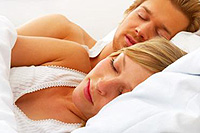 Central type of sleep apnea occurs much less often obstructive type. It is associated with the fact that certain brain departments responsible for the regulation of breathing function incorrectly. Typically, the cause of the disorders of the central nervous system, there may be an injury or any pathological process in the brain barrel, such as stroke, brain tumor, viral infection or chronic respiratory diseases. Sometimes, with the central type of night apnea syndrome, people can snore, which makes it difficult, respectively, the diagnosis. Although the reasons for these two types of apnea are different, their manifestations are the same. Treatment of the central apnea lies in the appointment of drugs that stimulate the respiratory center.
Central type of sleep apnea occurs much less often obstructive type. It is associated with the fact that certain brain departments responsible for the regulation of breathing function incorrectly. Typically, the cause of the disorders of the central nervous system, there may be an injury or any pathological process in the brain barrel, such as stroke, brain tumor, viral infection or chronic respiratory diseases. Sometimes, with the central type of night apnea syndrome, people can snore, which makes it difficult, respectively, the diagnosis. Although the reasons for these two types of apnea are different, their manifestations are the same. Treatment of the central apnea lies in the appointment of drugs that stimulate the respiratory center.
Mixed type of sleep apnea. At the same time, a combination of causes causing the development of apnea. People with this type of apnea often suffer from snoring. It detects that the treatment of obstructive type of apnea does not eliminate the manifestations of the disease. Therefore, in this case, a combination of treatment methods is necessary.
What happens when you stop breathing in a dream? In the night apnea syndrome, when the respiratory stop occurs in a dream, there is a disruption of the balance of oxygen content and carbon dioxide in the blood. This gas balance disorder leads in turn to the stimulation of the respiratory center, which is manifested by the resumption of respiration. The brain makes a person wake up, with the result that the muscles of the language and larynx increase the clearance of the respiratory tract. After that, carbon dioxide from the blood is displayed, and the blood is saturated with oxygen. Such episodes of waking up a patient with a night apnea syndrome are needed to resume breathing (and save lives), however, as a result, chronic lack of sleep occurs.
Thus, the main factors affecting health are the lack of oxygen and lack of sleep.
- Lack of sleep. From lack of sleep, usually suffer from both the night apnea syndrome and the one who sleeps with him. Every time both of them lose almost an hour of sleep. In addition, a patient with a night apnea syndrome may also suffer from various other diseases, such as frequent urination at night or sweating. The lack of sleep can influence the immune system, the emotional state of the patient, lead to irritability and some other issues.
- Lack of oxygen. The lack of oxygen can lead to serious problems, such as diseases of the heart, raising blood pressure, sexual disorders and memory violation.
Depression and sleep apnea
The researchers have proven that every fifth, suffering from depression, in one way or another suffers from night apnea syndrome. And people suffering from night apnea syndrome are five times depressed. Although it is unknown, calls the night apnea depression, or vice versa, studies show that the elimination of manifestations of the night apnea syndrome eliminates and depression.

